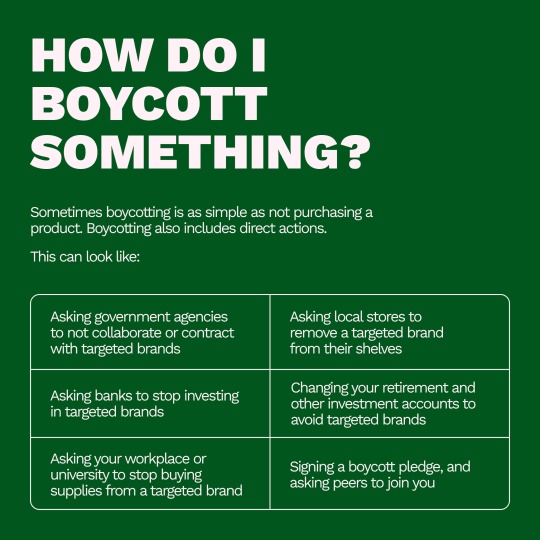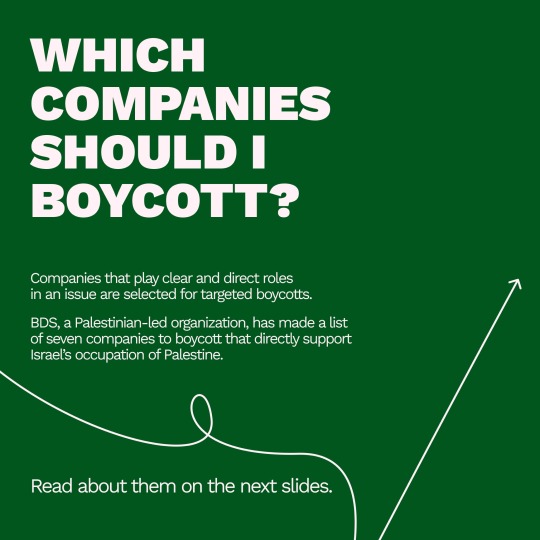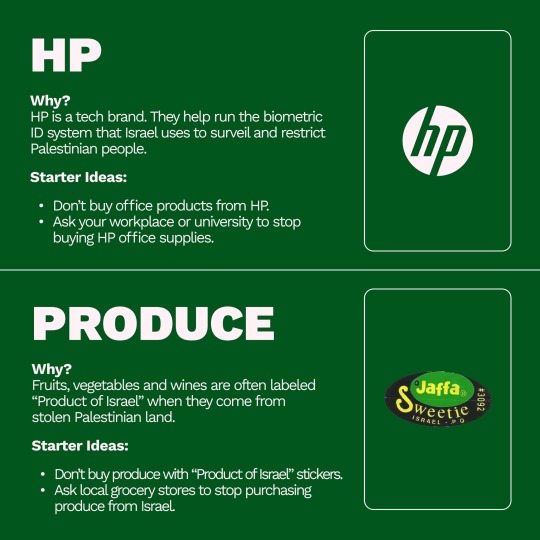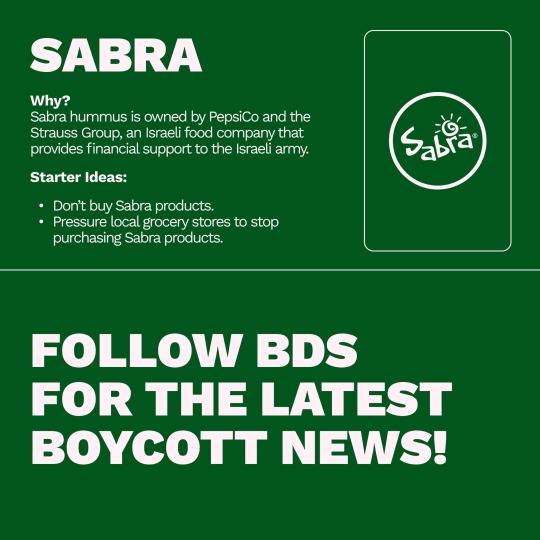#you can also check the BDS list to see what other companies you should boycott on top of these three
Text
saw this on Twitter, so... here's a reminder to keep boycotting or start doing so if you were unaware of the boycotts!

also, remember to do your daily clicks here (it's 100% free to do; how it works is that it generates ad revenue that goes towards aiding Palestinians), spread word about what's going on, and donate to vetted fundraisers if you're able to!
#pro palestine#from the river to the sea palestine will be free#christians for a free palestine#boycott for palestine#boycott mcdonalds#boycott starbucks#also remember to:#boycott disney#you can also check the BDS list to see what other companies you should boycott on top of these three#and remember that this doesn't stop at Palestine; there are MULTIPLE other countries facing things like genocides and we need to do what -#- we can to bring attention to that and support the people who need help in those countries as well#because no one is free until everyone is free
59 notes
·
View notes
Note
Hey, my lovely mutual, could you please enlighten what exactly Lando did and preferably with receipts if you don't mind so more people would be educated on this?
hello, thank you for asking nicely, i'll do my best to summarize everything. :))
so, yesterday Lando posted on his land0.mov account, and the post is a video about him walking around in Melbourne and there was a shot of him holding a Starbucks cup.

people quickly noticed and started calling him out on it, because of the ongoing boycott against Starbucks, which is happening because of the genocide of Palestinian people. people were trying to educate him and make him realize that his actions were wrong and ignorant.
some of his fans started defending him, saying that he may not be aware of the boycott, which i find highly unlikely. he's known to be chronically online, there is no way he didn't hear about it at least once. there are also protests happening worldwide, people are rallying on the streets and more and more celebs speak out, demanding an immediate and permanent ceasefire.
the other argument they brought up in his defence was that Starbucks has nothing to do with Palestine, because the boycott originally happened because the company sued their Workers Union over a post they made following October 7th (when the current genocide started) that was expressing solidarity with the Palestinian people. the law suit was filed because of copyright infringement, the Union's logo is very similar to the Starbucks logo. the company also stated that the post does not represent their views, saying they have no stance on the situation and they deleted the post shortly after, following numerous complaints against the company. if you want to you can read more about that here:
the company is not on the BDS movement's official list, but they backed up the union and Starbucks is widely accepted as one of the companies to boycott in support of Palestine. it also has ties with Nestle and Pepsico, which are two major companies on the BDS movement list. there are more important companies to boycott and you should by all means boycott them, but that does not mean you cannot boycott Starbucks too. it is one of the most widely known boycotts happening right now, because the company is extremely popular.
i will post some articles and websites that explain this situation in depth, so if you're interested you can check them out.
and here is the official BDS movement's list of the most important companies we should boycott.
i tried to keep this brief, cause i already made a lot of posts about it, so if you want to see those too, i'll link them below.
17 notes
·
View notes
Text








You can use your consumer power to support Palestine!
Here’s how:
WHAT IS A TARGETED BOYCOTT?
Imagine a group of people where each person is boycotting a different company. Now imagine a group of people where each person boycotting the same company. The second group has organized a targeted boycott.
Targeted boycotts focus consumer power on select companies to create incremental, yet high-impact change. Once a targeted company changes its behavior, consumers move on to boycotting a new one.
HOW DO I BOYCOTT SOMETHING?
Sometimes boycotting is as simple as not purchasing a product. Boycotting also includes direct actions.
This can look like:
Asking government agencies to not collaborate or contract with targeted brands.
Asking banks to stop investing in targeted brands.
Asking local stores to remove a targeted brand from their shelves.
Asking your workplace or university to stop buying supplies from a targeted brand.
Changing your retirement and other investment accounts to avoid targeted brands.
Signing a boycott pledge, and asking peers to join you.
WHICH COMPANIES SHOULD I BOYCOTT?
Companies that play clear and direct roles in an issue are selected for targeted boycotts.
BDS, a Palestinian-led organization, has made a list of seven companies to boycott that directly support Israel's occupation of Palestine.
AHAVA
AHAVA is a cosmetics brand. They have factories and a main store on an Israeli settlement.
Starter Ideas:
• Don't buy AHAVA products.
• Write or call local beauty supply stores and ask them to remove AHAVA from their shelves.
АХА
AXA is an insurance provider. They invest in Israeli banks that fund Israel's theft of Palestinian land and resources.
Starter Ideas:
• See if you can switch insurance providers.
• Spread the word about AXA's investments.
HP
HP is a tech brand. They help run the biometric ID system that Israel uses to surveil and restrict Palestinian people.
Starter Ideas:
• Don't buy office products from HP.
• Ask your workplace or university to stop buying HP office supplies.
PRODUCE
Fruits, vegetables and wines are often labeled "Product of Israel" when they come from stolen Palestinian land.
Starter Ideas:
• Don't buy produce with "Product of Israel" stickers.
• Ask local grocery stores to stop purchasing produce from Israel
PUMA
PUMA is an athletic brand. They sponsor teams from Israel's Football Association that occupy Palestinian land.
Starter Ideas:
• Don't buy athletic gear from PUMA.
• Write or call sports teams, clubs, and athletes, and ask them to drop PUMA.
SIEMENS
Siemens is a multinational company. They helped Israel build settlements on Palestinian land by supplying electricity and fossil fuels.
Starter Ideas:
• Check if your retirement account is investing money to Siemens.
• Support the EastMed pipeline campaign.
SABRA
Sabra hummus is owned by PepsiCo and the Strauss Group, an Israeli food company that provides financial support to the Israeli army.
Starter Ideas:
• Don't buy Sabra products.
• Pressure local grocery stores to stop purchasing Sabra products.
FOLLOW BDS FOR THE LATEST BOYCOTT NEWS!
20 notes
·
View notes
Text
After 10 days of perilous violence that resulted in over 200 lives lost, a cease-fire agreement between Israel and Hamas went into effect on Friday.The putative break from hostilities follows waves of Israeli airstrikes on the Palestinian city of Gaza that began on May 10 amid a broader conflict over the eviction of four Palestinian families in East Jerusalem’s Sheikh Jarrah neighborhood. As those attacks continued, the rising Palestinian death toll and the destruction of vital infrastructure in Gaza sparked mounting global outrage as well as calls to end the violence.
But despite the possibility of a respite from the more overt attacks of the last two weeks, Palestinians — who bore the brunt of the casualties and the destruction — are still in need of financial aid, basic resources, and increased international support. The struggle is far from over for the residents of Gaza, especially for the LGBTQ+ Palestinians who are used as a rhetorical cudgel to “pinkwash” the conflict while dealing with their own unique struggles at home.
Here are 5 crucial ways you can help support the lives of Palestinians as they look to recover and rebuild.
1. Donate and Boycott
There are a number of reputable grassroots organizations you can support that are aimed at ending the Israeli occupation of Gaza and improving the day-to-day lives of Palestinians living in peril. Standouts include The Palestine Child Relief Fund; IF Charity, which distributes funds to families impacted by violence in Gaza; and Doctors Without Borders, an international organization that provides medical treatment to victims.
Another notable movement is Boycott, Divestment, and Sanctions, also known as BDS. It’s an economic protest, similar to the Montgomery bus boycotts of the civil rights era, that calls for consumers across the world to stop purchasing products from influential companies that have business ties to Israel.
You can find the full list of companies BDS is boycotting here.
2. Amplify Palestinian Voices
During this time, it is crucial that we make space for Palestinian communities to be heard, felt, and understood. We should be especially mindful of the fact that America, a global superpower, has historically played its own insidious role in the decades-long struggle between Israel and Palestine.On social media, make a concerted effort to follow and share Palestinian voices and their experiences. If you’re not sure where to start, some progressive voices include Mohammed El-Kurd, a writer and poet, who has been vocal about his own struggles in Palestine, and Yara Hawari, a feminist advocate who holds a PhD in Middle East Studies and frequently provides vital contextualization on the conflict in Gaza for various media outlets.For a more streamlined perspective, you can also follow the “Silenced Voices of Gaza” Twitter list for a collection of tweets from journalists, activists, and humanitarians who are based in Gaza.
3. Shop Palestine
There are a number of brands and products made by Palestine-based companies and creators that you can buy from directly, helping to support the local Gaza economy. The online marketplace Shop Palestine sells an assortment of products from Palestinian merchants, including hand-woven rugs, ceramics, jewelry, and ships internationally. (Note: They’re currently experiencing a delay in shipments, due to a sudden influx in orders.)You can also support the wider diaspora. Check in your area to see if there are shops and restaurants owned by Palestinian immigrants or individuals with ties to the West Bank.
4. Read Widely
One major way to help support Palestinians is to get a more accurate, nuanced view of the current situation and the history behind it. A number of academic studies have exposed the media-biases Western outlets often display when reporting on the Israel-Palestine conflict, whether consciously or unconsciously. As readers become more aware of those biases, they have begun questioning who is best served by traditional “objectivity” best serves. On Thursday, for example, after the Associated Press fired news associate Emily Wilder for publicly sharing her criticisms of Israel’s actions against Palestine, an uproar followed that may not have been quite so loud even a few years ago.
So how can you ensure you are getting an accurate view of the conflict? Read across multiple outlets. Also, do not rely solely on the day-to-day news cycle to understand the Middle East conflict. Books often offer deeper and more nuanced views on issues. This Penguin Random House reading list is a standout starting point.
5. Talk with Friends and Family
Educate others. Conversations with friends and family members can have a powerful effect on personal views and beliefs. Speak with the people close to you about your concern for the people of Palestine and share what you have learned. (Pose star Indya Moore recently modeled what these conversations can look like by hosting an Instagram Live about violence against Palestine.)
The more you talk to people, the more you’ll probably hear a common refrain: “The situation is just so complicated.” Just because something is complicated doesn’t mean we shouldn’t seek to understand it, though. The web resource Decolonize Palestine notes that “an appeal to complexity is also a way to silence your own conscience.” Saying that the situation is complex, in other words, is a way to avoid reckoning with the violence that Palestinians face.To change the conversation, all of us must challenge and interrogate our biases while holding each other accountable.
4 notes
·
View notes